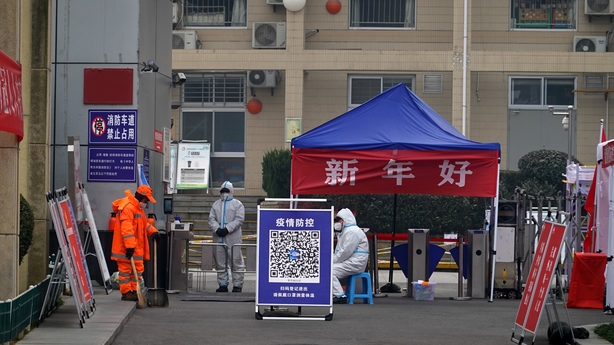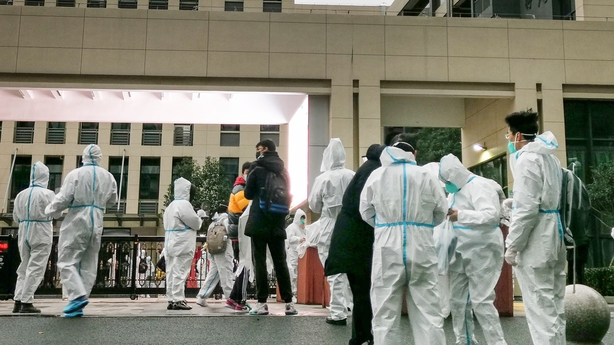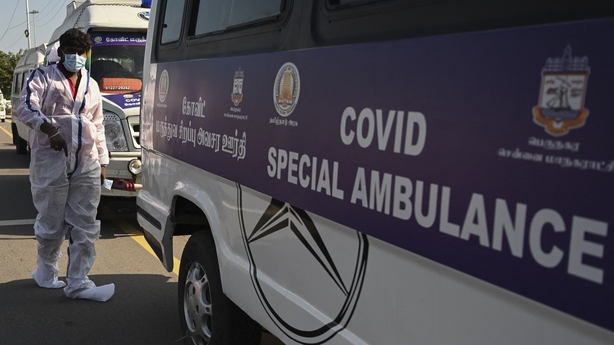Data from Israel supported growing evidence worldwide that Omicron causes milder illness than previous variants of the coronavirus, even as the country grappled with a record number of daily infections.
Total hospitalisations as of yesterday stood at 363 patients, after the Health Ministry reported more than 16,000 new cases - a record high in Israel since the start of the pandemic - with a daily increase of 34 people falling severely ill.
During the height of Israel's Delta variant wave, the record number of people infected topped 11,000, with the number of those falling severely ill increasing daily by around 100 and 1,300 people hospitalised.
"Our initial data, which is not yet entirely accurate, points to seven to eight people hospitalised for 1,000 infected, two of whom will fall severely ill or worse," Sharon Alroy-Preis, the ministry's head of public health, told Army Radio.
"This is a significant change from Delta which saw far more- at least 10 severely ill for every 1,000 infections," she said.
A World Health Organization official said on Tuesday that more evidence was emerging of Omicron affecting the upper respiratory tract, causing milder symptoms than previous variants and resulting in a "decoupling" in some places between soaring case numbers and low death rates.
With infections rising fast, Israel's testing centres have been buckling under the pressure, prompting health officials to prioritise risk groups and trust younger, vaccinated populations to test at home if exposed to a carrier.
Risk groups have also been green-lighted for a fourth dose of a Covid-19 vaccine and for Pfizer and Merck's antiviral Covid-19 medications.
A week into a fourth dose trial at a major Israeli hospital, researchers saw participants' antibody levels increase five-fold.
But Gili Regev-Yochay, who is leading Sheba Medical Centre's study, said that while the jump restored protection provided by a third dose, it was lower than what she had hoped for.
"I expect to see it continue rising, the peak of antibodies usually occurs two to four weeks in," she told Army Radio.
China's Henan adds Covid curbs as cases rise
More cities in central China resorted to tough curbs as new coronavirus infections in Henan province rose sharply, with authorities taking urgent action to contain clusters ahead of the Winter Olympics and Lunar New Year peak travel season.
Henan reported 64 domestically transmitted local infections with confirmed symptoms for yesterday, up from just four a day earlier, official data showed today.
Although the numbers are tiny compared with many places in the world, and no cases of the highly transmissible Omicron variant have been reported so far in Henan, several cities the reimposed new limits on travel or economic activities in response to a rash of new cases.

China's national policy of stamping out clusters quickly as they appear has taken on extra urgency in the run up to the Winter Games, being hosted by Beijing and nearby Hebei starting 4 February.
Gushi, a county in Henan of 1 million residents, reported one symptomatic case and one asymptomatic carrier, but that was enough to persuade local officials to stop people from leaving town and dissuade others from coming.
The city of Xuchang required local officials to minimise movement of people as mass testing on its more than 4 million residents was being rolled out between today and tomorrow.
In Yuzhou city, part of Xuchang's conurbation, 1 million residents are already under lockdown.
Several cities, including Hebi and Kaifeng which are yet to report any new infections recently, have shuttered some cultural and entertainment venues.
Although no local infections were reported in Yongji, a city in the northern province of Shanxi, authorities there ordered all its 400,000 residents to remain indoors and businesses and schools to suspend activities, after samples taken from a train station turnstile tested positive for the virus.

Mainland China has only announced a handful of Omicron cases from international travellers and at least one locally transmitted infections, but it has intensified efforts to reduce the risk of the variant being brought in from overseas.
Travellers planning to fly to China from the United States, where Omicron is spreading rapidly, must complete a nucleic acid Covid test seven days before departure, and report their body temperature daily for one week, on top of existing requirements, according to notices published on Tuesday on the websites of the Chinese embassy in the US and several consulates.
Omicron spreads in India's big cities but hospitalisations still low
Indian megacities Delhi, Mumbai and Kolkata are experiencing a surge in Covid-19 cases, although without a corresponding rise in hospitalisations, but fears are growing about a spread to rural areas in coming days.
India reported 90,928 new daily Covid-19 cases today, up nearly four-fold since the start of the year, mostly from cities where health officials say the Omicron variant has overtaken Delta.
The bulk of those infected have shown no or only mild symptoms and have recovered quickly at home, officials said.
The federal health ministry identified Delhi, Mumbai, Kolkata, Chennai and Bengaluru as some of the main regions of concern, although state officials worry the disease will soon spread to the countryside where health facilities are weaker.
Kolkata, a city of about 15 million, accounted for half of the new cases in the eastern state of West Bengal until a few days ago, but cases are now rising in neighbouring districts. The state has reported one of the highest rates of infections in India.

Covid-19 cases nearly doubled in a day in Delhi to 10,665 yesterday, but the state said only 7% of its Covid hospital beds were occupied.
Federal health officials, however, have warned even a large number of mild cases could put pressure on the health system.
India has confirmed at least 2,135 Omicron cases and one death linked to the variant.
Daily Covid-19 deaths rose by 325, taking the total to 482,876. Total infections are at 35.11 million, only behind the US tally.
Many Indian cities have already imposed night curfews and weekend lockdowns, as well as closed schools.
Political rallies, however, have continued in several states where elections are due in the next few weeks and months.
Health authorities will discuss the matter with election commission officials amid rising concerns about such rallies that led to a devastating second wave in the country in April and May.

